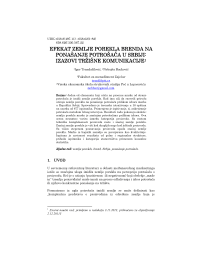Efekat zemlje porekla brenda na ponašanje potrošača u Srbiji: izazovi tržišne komunikacije
Автор: Igor Trandafilović, Nebojša Backović
Журнал: Ekonomski signali @esignali
Статья в выпуске: 2 vol.8, 2013 года.
Бесплатный доступ
Jedan od elemenata koji utiču na procenu marke od strane potrošača je imidž zemlje porekla. Rad ima cilj da rasvetli prirodu uticaja zemlje porekla na ponašanje potrošača prilikom izbora marke u Republici Srbiji. Sprovedeno je terensko istraživanje u 18 opština na uzorku od 677 ispitanika. Primenjeno je ispitivanje, tj. anketiranje potrošača metodom ličnog intervjua. Rezultati rada pokazuju sledeće: zemlja porekla marke je značajna potrošačima prilikom izbora. Ova ocena neznatno varira između kategorija proizvoda. Sa rastom tehničke kompleksnosti proizvoda raste i značaj zemlje porekla. Značaj zemlje porekla je viši kod skupljih nego kod jeftinih proizvoda. Sa višim stepenom poznavanja proizvoda opada značaj zemlje porekla. Marke iz bogatih zemalja su percipirane kao kvalitetnije. Ispitana je zavisnost rezultata od polne i regionalne strukture, prihoda ispitanika i kategorija stanovništva primenom kauzalne statistike.
Zemlja porekla, brend, Srbija, ponašanje potrošača
Короткий адрес: https://sciup.org/170204186
IDR: 170204186 | УДК: 658.8(497.11) ; 658.62(1-82); 658.626:330.567.22
Список литературы Efekat zemlje porekla brenda na ponašanje potrošača u Srbiji: izazovi tržišne komunikacije
- Balabanis G., Diamantopoulos A.: Gains and Losses from the Misperception of Brand Origin: The Role of Brand Strength and Country of Origin Image. Journal of International Marketing, American Marketing Association, Vol. 19, No. 2, pp. 95–116. (2011)
- Beverland M., Lindgreen A.: Using country of origin in strategy: The importance of context and strategic action. The Journal of Brand Management, Volume 10, Number 2, (November 2002)
- Biswas K., Chowdhury MKH, Kabir H.: Effects of Price and Country of Origin on Consumer Product Quality Perceptions: An Empirical Study in Bangladesh. International Journal of Management, Vol. 28 No. 3 Part 1, p. 659-674. (Sept 2011)
- Chinen K., Enomoto C.E., Costley D.L.: The country-of-orgin effect on Toyotas made in Japan, the USA and Mexico. The Journal of Brand Management, Volume 8, Number 2, p.139. (November 2000)
- Country of Origin does not matter to most Americans. Farmers Guardian, May, 2005., p.77
- Gilmer R.: Working to keep COOL. Florida Grower, Willoughby, Jun, p.25. (Jun 2003)
- Johansson J. K., Douglas S. P., Nonaka I.: Assessing the impact of country-of-origin on product evaluations: A new methodological perspective. Journal of Marketing Research, 22, p.395. (1985)
- Jyh-shen C.: The impact of country of origin on pretrial and posttrial product evaluations: The moderating effect of consumer expertise. Psychology & Marketing, Hoboken: Vol.20, Iss. 10, p.935. (Oct 2003)
- Khan A. M.: The Relative Importance of the Factors Influencing Consumer Perception of Product Quality Across Cultures: A Two Country Empirical Analysis. Doctoral thesis, Touro University International, Cypress, California, p.3. (2005)
- Klein J. G., Ettenson R., Morris M.: The animosity model of foreign product purchase: An empirical test in the People's Republic of China. Journal of Marketing, Chicago. p.89. (Jan 1998)
- Koschate F. N., Diamantopoulos A., Oldenkotte K.: Are Consumers Really Willing to Pay More for a Favorable Country Image? A Study of Country-of-Origin Effects on Willingness to Pay. Journal of International Marketing, American Marketing Association, Vol. 20, No. 1, pp. 19–41. (2012)
- Laufer D. M.: Product crises and consumers' assessment of blame: Is there an impact of country of origin?. Doctoral thesis, The University of texas at Austin, p.4-5. (2002)
- Mack L. W.: A value-expressive model of country-of-origin, the influence of individual respondent characteristics, and consumer attitude on preference of origin-based brands. Doctoral thesis, Nova Southeastern University, p.11-12. (2000)
- Madden N.: Brand origin not major factor for most Asians. Advertising Age (Midwest region edition), Chicago: p.33. (Apr 2003)
- Martell R.: Talk: Do your customers care about where you source your products? Cabinet Maker, Tonbridge: p.9. (Apr 2005)
- Morrish S. C., Lee C.: Country of origin as a source of sustainable competitive advantage: the case for international higher education institutions in New Zealand. Journal of Strategic Marketing, Vol. 19, No. 6, p. 517–529. (October 2011)
- Oh Mi Y.: South Korean attitudes towards foreign subsidiaries of multinational corporations (MNCs): The influence of corporate image and country of origin image, and the presence of halo effect. Doctoral thesis, Southern Illinois University at Carbondale, p.22. (2001)
- Parsons A., Ballantine P., Wilkinson H.: Country-of-origin and private-label merchandise. Journal of Marketing Management, Vol. 28, Nos. 5–6, p. 594–608. (May 2012)
- Peng Z., Lawley M., Perry C.: Modelling And Testing Effects Of Country, Corporate And Brand Images On Consumer´s Product Evaluation And Purchase Intention. ANZMAC, smib.vuw.ac.nz:8081/www/ANZMAC2000/CDsite/papers/p/Peng1.PDF . (2000)
- Rakita B.: Međunarodni marketing, Globmark, Beograd, str. 568. (1998)
- Reuber R., Fischer E.: When Nobody Knows Your Name: Country-ofOrigin as a Reputational Signal for Online Businesses. Corporate Reputation Review, Macmillan Publishers Ltd., Vol. 14, No. 1, pp. 37– 51. (2011)
- Schooler R.: Product Bias in the Central American Common Market. Journal of Marketing Research, Vol. 2, No. 4, p.394-397. (Nov 1965)
- Solomon M., Bamossy G., Askegaard S.: Consumer Behaviour. A European perspective. Prentice Hill Inc., p.589. (1999)
- Swystun J.: Canada's reticent brands: no Canadians made Interbrand's ranking of the top 100 global brands [Why and what we can do about it]. Marketing Magazine, p.15. (Sep 2001)
- Ulgado F., Lee M.: The Korean versus American marketplace: Consumer reactions to foreign products. Psychology & Marketing, Hoboken, p.595. (Sep 1998)
- Veysel Y.: The moderating role of country-of-destination image on product evaluation: An exploratory study (Turkey, United States). Doctoral thesis, University of Illinois at Chicago, p.5-24. (2003)


